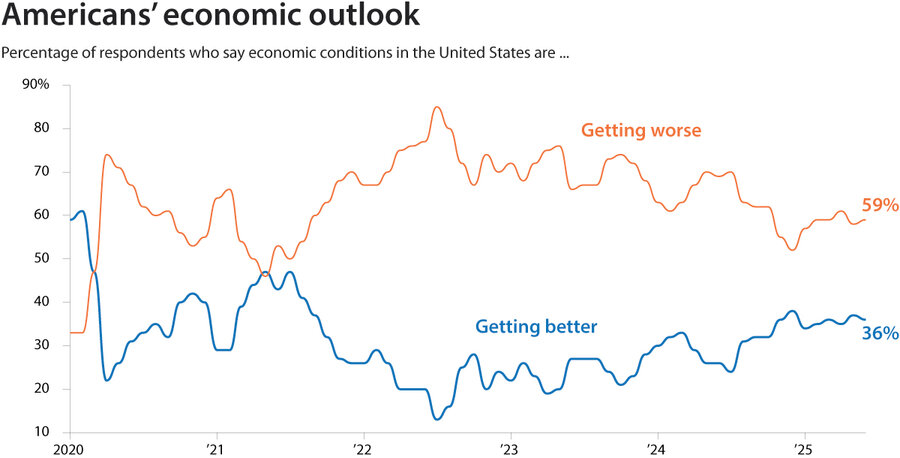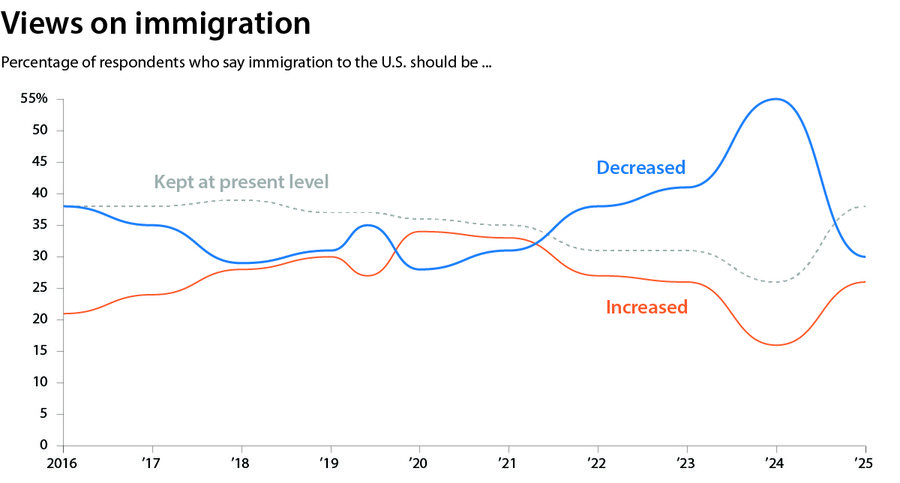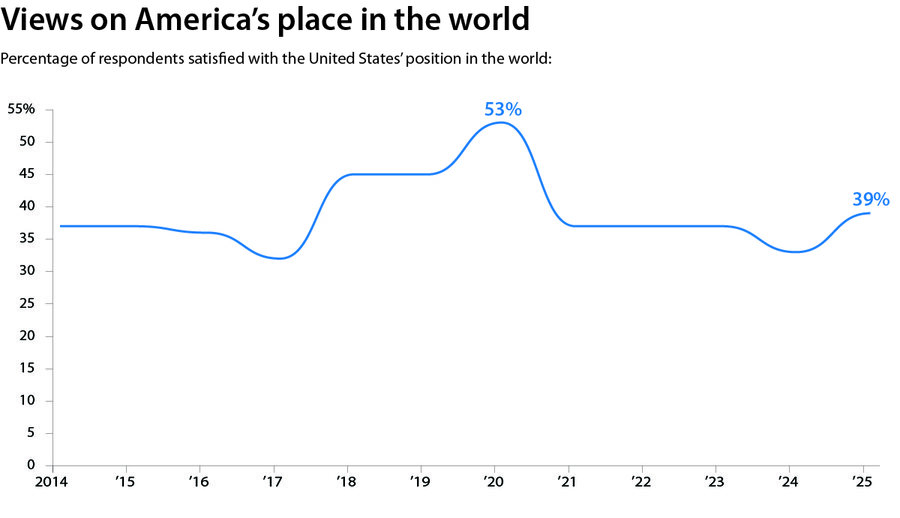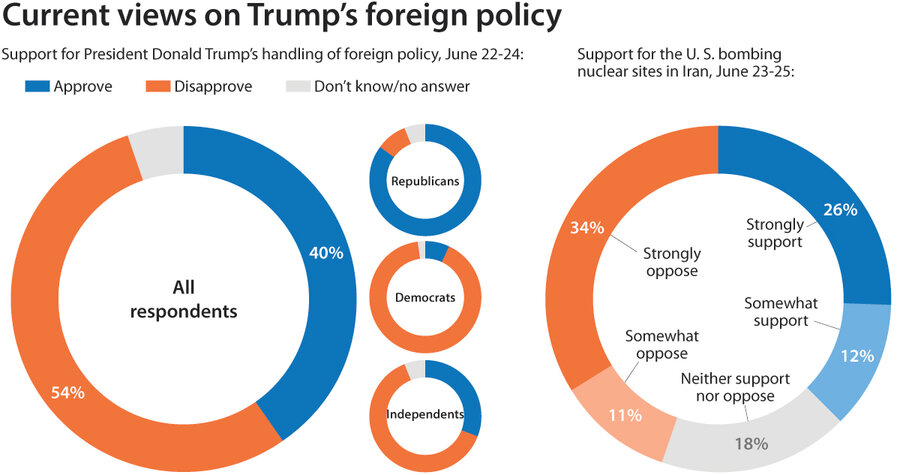On the campaign trail, President Donald Trump pledged to lower prices, deport millions of immigrants living in the country illegally, and put “America first” in global affairs. Voters elected him in part because they trusted him more on those issues – especially the economy and immigration – than they did then-Vice President Kamala Harris.
Six months into Mr. Trump’s second term, that trust appears shaken. In a poll this month by YouGov and The Economist, 57% of respondents said the country was headed in the wrong direction. That’s an increase of 7 percentage points since week one of the Trump presidency. In the same survey, slim majorities disapproved of Mr. Trump’s handling of the economy and immigration. And in June, 51% opposed his foreign policies.
Most U.S. presidents experience a drop in their approval ratings after the first few months in office, as the glow of campaign promises confront governing realities. Mr. Trump has been quick to try to fulfill his agenda: He set a record for executive actions issued during his first 100 days in office, while pushing the boundaries of executive power. The latest public opinion polls indicate these actions do not have broad public support.
Why We Wrote This
President Donald Trump started his second presidency with a burst of executive actions on issues core to his electoral success, such as the economy and immigration. Public support for him on those issues is starting to slip.
Dissatisfaction with Mr. Trump’s handling of the economy and immigration increased by 14 and 11 percentage points, respectively, between February and July. Other polls released in the last month – from Pew Research Center, Quinnipiac University, and Fox News – show the same trend.
Some of the president’s policies have drawn more support than opposition. Those include ending taxes on tips and overtime wages and more stringent work requirements for adults without disabilities or children receiving Medicaid, both of which were included in the tax and spending bill Mr. Trump signed into law on July 4.
The president’s overall approval rating has declined 7 percentage points since the start of his term and now stands at 40%, according to Gallup. That’s in line with public opinion during his first term.
The economy
In most polls, voters rated the economy as the most important issue in the 2024 election and gave Mr. Trump high marks for their expectations of how he would handle Americans’ pocketbook concerns.
The president’s signature economic move – threatening, and in some cases imposing, high tariffs against most countries – was previewed on the campaign trail. Since taking office, he has announced tariffs, delayed some, and changed the rates of others. Worries over his on-and-off-again tariffs have shown up in polling.
In April, nearly three-quarters of voters told Quinnipiac University that tariffs would hurt the economy in the short term, and 53% said they would in the long term. Some 60% of people told YouGov in July that they disapproved of how the president has handled inflation, compared with 43% in February. The U.S. inflation rate ticked up slightly in May and June.
The newly passed recent tax-and-spending law, expected to add about $3 trillion to the national debt, seems to have also ruffled some feathers. A plurality of Americans (49%) opposed the bill in June, and 54% said they believed it will have a mostly negative impact on the economy, according to Pew.
The U.S. economy, however, has proven resilient. Despite economists’ warnings that President Trump’s policies could drive the U.S. into a recession, inflation hasn’t risen sharply.
The two political parties remain starkly divided: Since the 2024 election, Democrats’ confidence in the economy has cratered by 92 points, while Republicans’ confidence has skyrocketed by 95 points, according to Gallup’s Economic Confidence Index, which rates Americans’ views of current economic conditions on a scale from -100 to 100.
Immigration
On Inauguration Day, Mr. Trump signed a series of executive orders meant to seal the U.S. southern border and expel what he called an immigration “invasion.” Border Patrol encounters at the U.S.-Mexico border, a proxy for illegal immigration, have dropped precipitously since.
The Trump administration is also pushing for the largest deportation campaign in U.S. history, drawing protests over arrests that include people without criminal backgrounds.
Amid these efforts, Americans report less worry over immigration and more recognition of its benefits, compared with the prior four years.
About 30% of Americans want immigration to decrease, according to July polling from Gallup. That’s down from 55% in 2024. Nearly 80% of those surveyed said that immigration is a good thing for the country, an increase of 15 percentage points since last year and a reversal of a four-year downward trend.
Support has grown sharply among Republicans especially. In June 2024, only 39% of Republicans said immigration was good for the country. That’s risen to 64% today.
The recent numbers fall more in line with results from before illegal border crossings surged under the Biden administration, precipitating growing concern about the country’s immigration policies. Support for more enforcement efforts – such as hiring more border agents – remains strong (at 59%, according to Gallup) but has also declined.
Some 62% of respondents to Gallup’s July survey said they oppose Mr. Trump’s handling of immigration overall, including 45% who strongly oppose it.
Foreign policy
For the past two decades, Americans have felt generally more dissatisfied than satisfied with the nation’s standing in the world, in Gallup surveys taken each February. This year’s survey showed a modest rise in satisfaction – to 39% – whether related to Mr. Trump’s return to the White House or for other reasons. Satisfaction had risen – in one year to 53% – during his first term as president.
But so far in his new term, Mr. Trump’s foreign policy decisions, from his moves on trade to his handling of Israel’s war with Iran, have proven unpopular with a majority of Americans.
In a Quinnipiac University survey released June 26, some 54% of respondents disapproved of Mr. Trump’s foreign policy, and 53% disapproved of his handling of the Israel-Iran war.
Particularly noteworthy was Mr. Trump’s decision to bomb nuclear facilities in Iran. In a late June NBC poll, a plurality of Americans (45%) opposed the strikes.
In an earlier Quinnipiac poll, released June 11, Mr. Trump’s handling of trade and the war in Ukraine were his weakest issues, with 57% disapproving.
Americans also opposed some of Mr. Trump’s retreats from global alliances in a Pew poll released April 8. Pluralities (45% and 46%) opposed ending U.S. Agency for International Development programs and withdrawing from the Paris Climate Agreement, and a majority (52%) disapproved of leaving the World Health Organization.
















